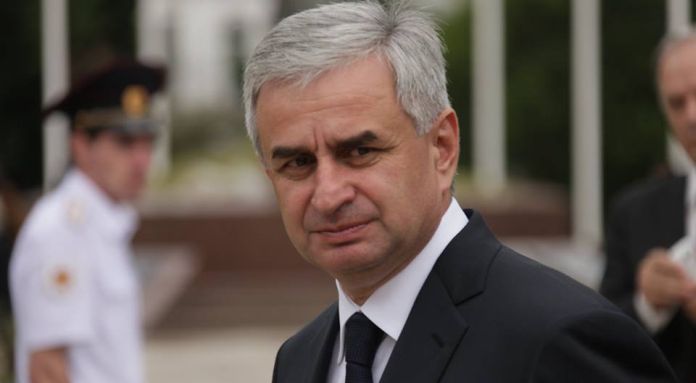
Russia Issues Ultimatum to Abkhazia
Publication: Eurasia Daily Monitor Volume: 11 Issue: 188
By:

By the end of October, the authorities in Sukhumi must respond to Moscow’s proposal to sign a new agreement “On Alliance and Integration” between the Russian Federation and the Republic of Abkhazia (abkhaziya.org, October 14). The fact that the draft document was leaked to the public, evoking a negative uproar among both the Abkhazian public and the Georgian government, indicates that the Abkhazian elites—including the new president, Raul Khadzhimba—oppose many of the clauses in the document that turn the separatist “state” into a territory under Moscow’s complete control.
The agreement envisages the de facto elimination of the Abkhazian army, border guards and the Ministry of Interior. Instead, some “coordinating offices,” headed by Russian appointees, and “joint military groups,” under the command of a general appointed by the Russian Ministry of Defense, are to be established. Abkhazians are also to be made eligible for recruitment into the Russian Armed Forces.
Apart from that, the proposed bilateral agreement obliges Abkhazia to synchronize its legislation in economic, social and humanitarian areas with the laws and legal norms of the Russian Federation. Russian customs offices will operate in Abkhazia under Russian customs legislation. Abkhazia is also expected to simplify the procedures for Russians to obtain Abkhazian citizenship, thus enabling them to buy and sell property and settle in the country. This threatens to turn the ethnic Abkhaz into a minority in their own country. Until recently, the Abkhazian authorities refused to consent to sales of land and houses to non-citizens.
In return for these concessions, Russia promises to establish complete control over the Abkhazian-Georgian border along the Inguri River and, simultaneously, completely open the Russian-Abkhazian border at the Psou River. Also, Moscow promises to make large investments, increase retirement payments to the Russian Federation citizens of Abkhazia and provide other social benefits, such as medical insurance, that other citizens of Russia enjoy (abkhaziya.org, October 14).
Up to now, the Abkhaz did not have these rights, although almost all of them hold Russian citizenship. “Moscow is signaling that without confirming their loyalty and complete subordination to the Russian government, [Moscow] will continue to regard the Abkhaz who hold Russian citizenship as second-class citizens, [and it will] not extend to them the same social benefits enjoyed by other citizens of the country,” informational-analytical agency GHN analyst Gela Kalandadze told Jamestown (Author’s interview, October 18).
Moscow hinted through its network of pro-Kremlin experts and journalists that if Abkhazia’s government does not agree to Russia’s version of the new agreement, Russia may halt retirement payments to ethnic-Abkhaz citizens of the Russian Federation or close down the Russian-Abkhazian border (publizist.ru, October 15). Even with the border closed, Russian military units stationed in Abkhazia could still receive their supplies via airlift at the airport in Bombora, situated at the Russian military base near the city of Gudauta.
The Abkhazian leadership is expected to respond with its own version of a new bilateral agreement, better reflecting Abkhazia’s interests (Civil Georgia, October 17). At the same time, Sukhumi is certainly considering other alternatives as well. The separatist government most likely closely examined the latest statement, delivered on October 17, by Georgian Prime Minister Irakli Garibashvili, who condemned Moscow’s attempt to “annex Abkhazia” and expressed readiness to publish his vision for the future of Georgian-Abkhaz relations (Civil Georgia, October 17).
“I know that the Georgian government is working on some new projects regarding relations with Abkhazia and Georgian-Abkhaz conflict settlement, but they have not been published or confirmed officially, yet,” Giorgi Anchabadze, a historian and professor at Sukhumi University, told Jamestown. “The Conflict in Abkhazia is not a Russian-Georgian conflict, but a Georgian-Abkhaz one. Therefore, an adequate response from Tbilisi will need to offer something new to the Abkhaz, who strive for independence,” Anchabadze said (Author’s interview, October 17).
It appears that, in response to the further political-economic expansion of Russia into Abkhazia as well as its increasing military presence there, the leaders of the governing Georgian Dream coalition are not ruling out any possible responses. Illustratively, the aforementioned October 17 statement by Prime Minister Garibashvili confirmed his respect for the “self-determination and freedom of the Abkhaz people.” The prime minister of Georgia signaled that his new proposals for resolving the Georgian-Abkhaz conflict would be based on these principles, but did not provide details on whether he meant the actual recognition of Abkhazia and its international sovereignty. Garibashvili’s foreshadowed new proposals may be designed to thwart Moscow from turning this separatist territory into a large Russian base, complete with Iskander missiles pointed at Georgian cities.
However, the majority of Georgian experts and politicians strongly criticized the head of the Georgian government for his statement. “Abkhazia cannot gain independence because it went through ethnic cleansing, and the majority of the Georgian population was driven from their homes. That is why the statement of Irakli Garibashvili is manifestly wrong and damages the national interest of the country,” the president of the Georgian Association for Reforms, Sergi Kapanadze, told Jamestown (Author’s interview, October 18). Additionally, the state minister of Georgia for reintegration and civil equality, Paata Zakareishvili, said that any form of relations between Georgia and Abkhazia was feasible, except for the full recognition of Abkhazia (ekhokavkaza.com, October 17).
The leaked Russian-Abkhazian agreement nearly ruined the pre-scheduled meeting of the Georgian prime minister’s special representative for relations with Russia, Zurab Abashidze, and the deputy minister of foreign affairs of the Russian Federation, Grigory Karasin, in Prague. Before the meeting, Abashidze told Jamestown that he planned to discuss with Karasin a proposed railway connection project between Russia and Georgia via Abkhazia (Author’s interview, October 9). But instead of talks on transportation projects, the meeting primarily focused on the “new agreement between Russia and Abkhazia.”
After his discussion in Prague with Abashidze, Deputy Foreign Minister Karasin struck a harsh tone, saying that Moscow would seek to sign the Russian-Abkhazian document on closer relations without any regard to Georgia’s reaction. Nevertheless, Karasin’s unwavering remarks failed to note that the Abkhazian authorities themselves—regardless of what the Georgian leadership thinks or wants—are also not happy with the prospect of giving up their statehood by signing an agreement that essentially lays the groundwork for Abkhazia’s accession into Russia.




